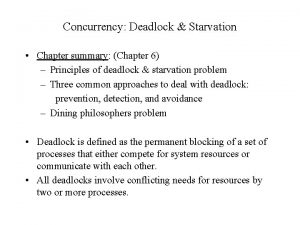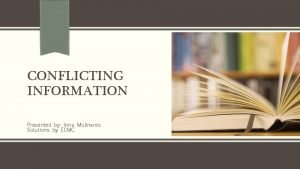Conflicting Reaction to Conflict in Politics Conflict Orientation

- Slides: 1

Conflicting Reaction to Conflict in Politics: Conflict Orientation as a Determinant of Political Behavior Emily Sydnor University of Virginia INTRODUCTION • Politics is frequently perceived as a site of conflict and confrontation, with pundits and politicians calling the contemporary landscape the most uncivil yet (Obama 2011; Geer 2012) • Because it is seen as hostile, citizens’ conflict orientation—their willingness to engage in debate or confrontation in the face of disagreement— influences their engagement with the political sphere (Ulbig and Funk 1999). • I demonstrate that an individuals’ conflict orientation is correlated with personality characteristics, and can shape political behavior and media consumption, especially for those who are particularly interested in politics. PROCEDURE • Participants (Ps). 952 Ps (46% female; Mage= 35. 6 years) were recruited from Amazon’s Mechanical Turk as part of two separate studies. 1, 766 Ps (65% female; Mage= 33. 2 years) participated through Project Implicit (https: //implicit. harvard. edu/implicit/). • Procedure. P’s first answered a subset of questions from three subscales (Approach/Avoidance, Public/Private, and Confrontation) of the Conflict Communication Scale (CCS, Goldstein 1999). They were then asked to either 1) report the number of days they watched, listened to, or read different types of media, or 2) rank their top two sources of news from the following list: newspaper, network television, cable television, radio, social media like Facebook and Twitter, talking to others, internet-only sources like the Huffington Post, and “don’t really follow political news. ” They were also asked to report their participation in a variety of political activities in the last year, and those in the PI sample filled out the Ten Item Personality Inventory. • The Conflict Communication Scale. The CCS is measured on a 5 -point Likert scale and includes statements like “I find conflict exciting, ” “I feel uncomfortable seeing others argue in public, ” or “I prefer to solve disputes through face-to-face discussion. ” DISCUSSION/NEXT STEPS • Conflict orientation is not a salient factor in the decision to engage in all political activity or media consumption, but rather only for those that emphasize the conflictual and confrontational nature of politics. • Political engagement is not only driven by political interest. Conflict orientation has a greater effect on engagement for those people who are also highly interested in politics, with the most conflict approaching individuals having a 30 percent greater likelihood of commenting on a political blog than their most conflict avoidant counterpart. • Future research: Participants were also asked to list their top three specific sources of news (e. g. WJLA, Fox and Friends, ). A content analysis of the civility and argumentation in each of these outlets will allow me to place them on a scale from most to least civil and to examine the correlation between individuals’ CCS scores and their preference for civil or uncivil media. REFERENCES AND ACKNOWLEDGEMENTS Goldstein, Susan. (1999). Construction and Validation of a Conflict Communication Scale. Journal of Applied Social Psychology 29(9): 1803 -1832. Green, M. C. , Visser, P. S. , & Tetlock, P. E. (2000). Coping with Accountability Cross-Pressures: Low-effort Evasive Tactics and High-Effort Quests for Complex Compromises. Personality and Social Psychology Bulletin, 26, 1380– 1391. Ulbig, S. G. , & Funk, C. L. (1999). Conflict Avoidance and Political Participation. Political Behavior, 21(3), 265– 282.

